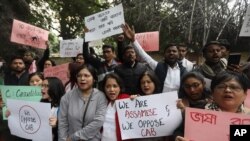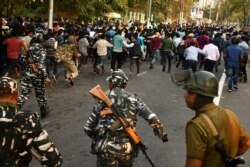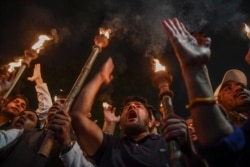India has passed a contentious citizenship bill that critics have slammed as unconstitutional and discriminatory because it excludes Muslims from a path to nationality that will be granted to religious minorities from three neighboring countries.
Violent protests have flared in the country's northeast, which staunchly opposes the bill due to fears it will grant citizenship to tens of thousands of Hindu illegal immigrants living in their region.
It is the first time the country has introduced religion as a criterion for citizenship. It makes six religious groups — Hindus, Sikhs, Christians, Jains, Parsis and Buddhists — who fled religious persecution in Pakistan, Bangladesh and Afghanistan before 2015, eligible to become Indian nationals.
The upper house of Parliament passed the Citizenship Amendment Bill on Wednesday with 125 voting in its favor and 105 opposing it. It already has been passed by the lower house and will become law once the president signs it.
In a tweet after the bill was passed, Prime Minister Narendra Modi called it "a landmark day for India and our nation's ethos of compassion and brotherhood."
Debate on the bill
His opponents did not agree. Questioning why the bill has excluded Muslims, opposition parties, human rights groups and many intellectuals called it a ploy by Modi's government to push a Hindu nationalist agenda, marginalize Muslims and weaken the country's secular foundations.
The government has staunchly denied the criticism. "For India's Muslims, there is nothing to worry about, nothing to debate. This is not a bill to snatch away anyone's citizenship, but to grant citizenship," Home Minister Amit Shah told Parliament on Wednesday.
BJP leaders say Muslims were excluded because they did not face religious persecution in the three countries covered in the scope of the bill — Pakistan, Afghanistan and Bangladesh. The BJP also points to shrinking Hindu populations in these Islamic countries to underscore that they are targeted for their religion. They also deny charges it violates the fundamental right to equality enshrined in India's constitution.
"It is constitutional, it is valid, it is in national interest and also serves a larger humanitarian interest," Law Minister Ravi Shankar Prasad said.
The main opposition Congress Party slammed the bill as "dangerous" and an attempt to destabilize and destroy the country's pluralistic ethos.
"Religion cannot be a factor in the acquisition of citizenship, which has been rejected by the constitution of India," Congress lawmaker Kapil Sibal told Parliament.
Critics have asked why groups such as the Rohingyas in Myanmar were excluded if the law's intention is to safeguard the rights of persecuted minorities.
Saying that India treats all faiths equally, a letter signed by 1000 intellectuals called the bill "a radical break with this history" and said it will "greatly strain the pluralistic fabric of the country."
A previous attempt to pass the bill in Modi's first term failed, but the BJP government pushed the bill within six months of its reelection, when it won power with a stronger majority. Although it still lacks a majority in the upper house of Parliament, it secured support from friendly parties.
Challenges of the bill
The bill most likely will face a strong challenge in the Supreme Court on the grounds it violates the country's secular constitution.
The first challenge for the government, though, will be to tackle intensifying protests against the bill led by students and civil society groups in northeastern states, where angry crowds set tires on fire, and blocked highways and rail lines. On Wednesday, the police used water cannons and tear gas to disperse protesters in Assam, and the paramilitary was put on standby in Tripura.
The bill faces opposition in these states for reasons linked to illegal immigration, which is a volatile issue in this region.
Tens of thousands of both Hindus and Muslims crossed over into these states from the porous border with Bangladesh about the time it became independent in 1971.
The Assamese fear the bill will offer a path to Hindus who are among two million illegal immigrants identified recently — they want all of them ousted regardless of religion.
The bill also has been criticized by the U.S. Commission on International Religious Freedom, a federal body, which said on Monday the measure goes against India's constitution, which guarantees legal equality to people of all faiths. It said Washington should consider sanctions against Home Minister Amit Shah, a close associate of Prime Minister Modi, if India adopts the legislation.
The Indian foreign ministry called the U.S. panel's condemnation of the bill unwarranted, saying it seeks to meet the basic human rights of persecuted religious minorities already in India. "Such an initiative should be welcomed, not criticized by those who are genuinely committed to religious freedom," foreign ministry spokesman Raveesh Kumar said in a statement.






